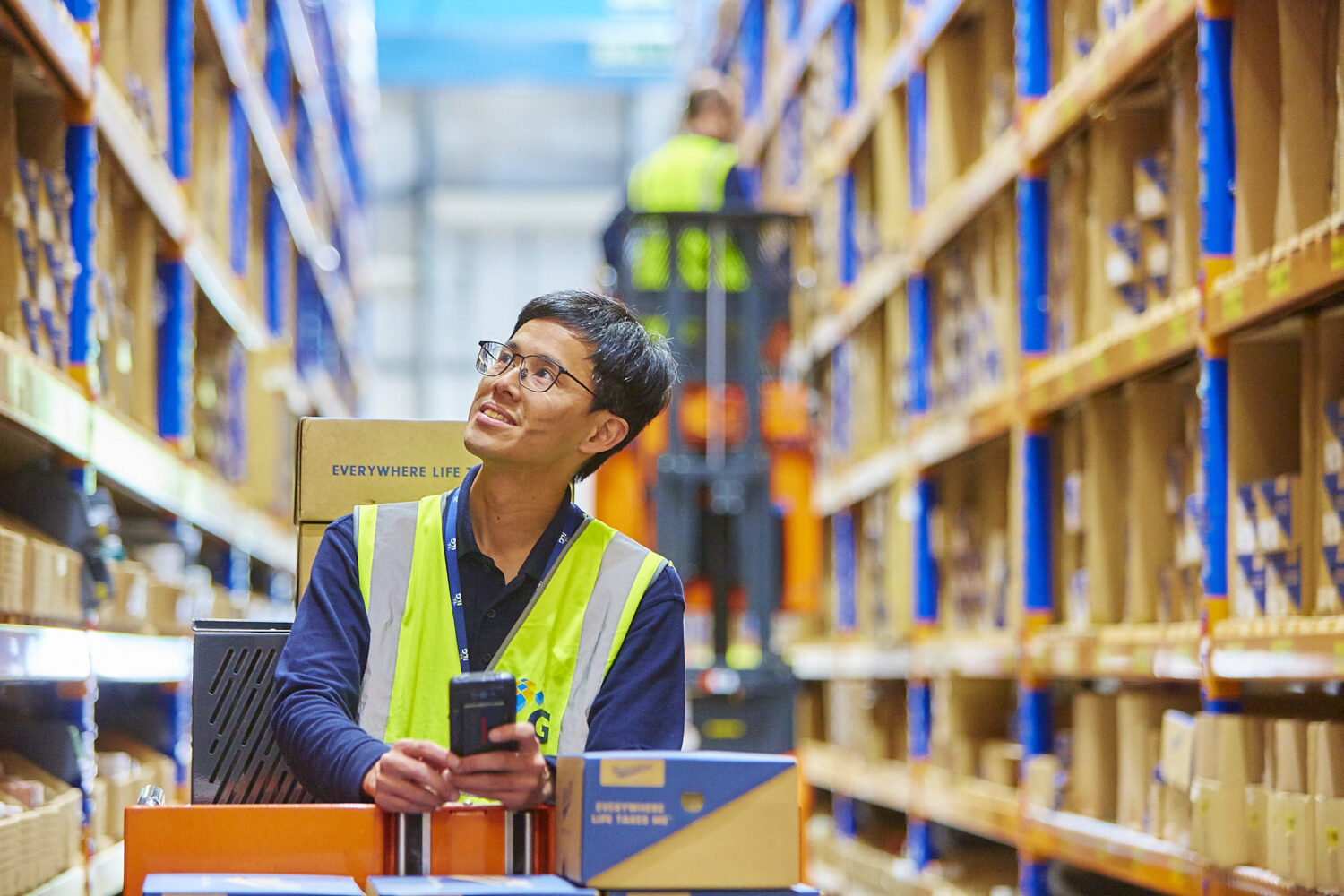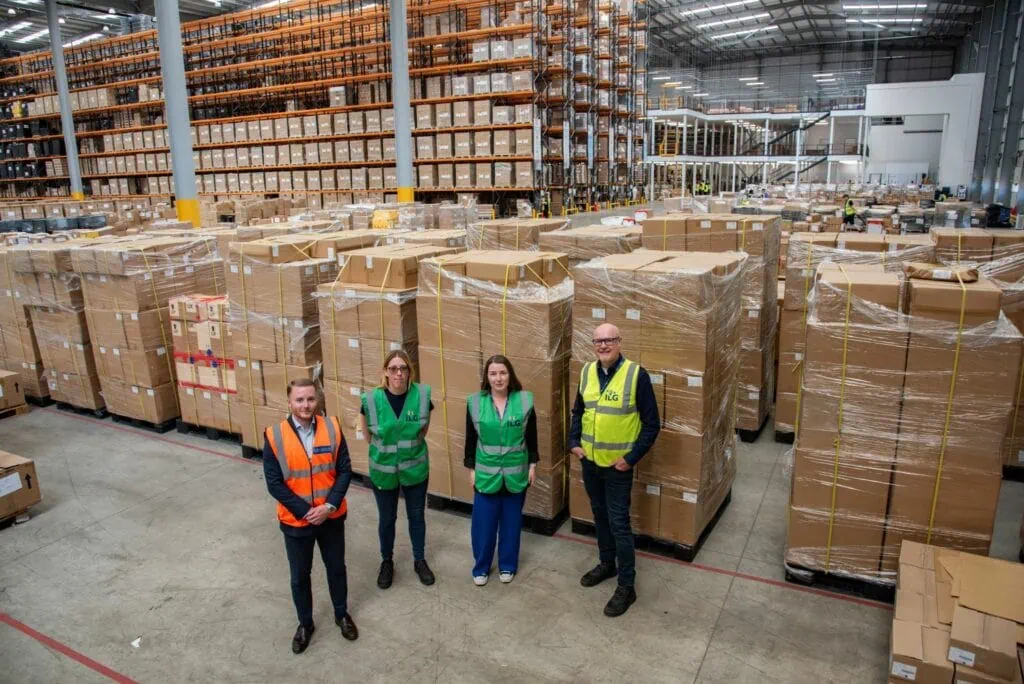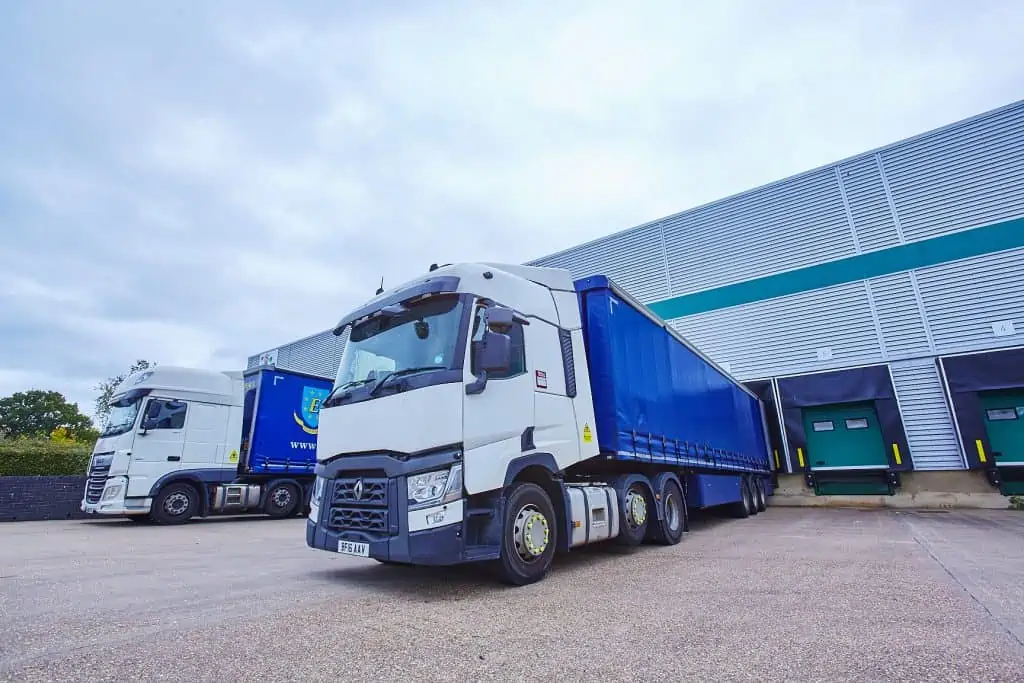
The UK represents a lucrative market for mainland European manufacturers and retailers, but brands are potentially spending upwards of £20 per order to ship to the UK. Localising your fulfilment in the UK could save drastically on costs, and improve service to UK-based customers.
European brands can also benefit from a specialist UK-based third-party fulfilment (3PL) partner to expertly navigate any complexities around expansion into a new market, whilst also taking advantage of a more cost-effective and future-proofed supply chain.
Jump to:
Why Expand into the UK?
The UK retail market is worth over £500 billion. It is a digitally advanced market, with consumers quick to latch on to omnichannel shopping experiences. E‑commerce accounts for around 30% of the market and is forecast to grow at 4-4.5% annually over the next five years.
Sustainability is also a driver. UK consumers, particularly younger shoppers, are increasingly aware of sustainable products, circular economy practices and supply‑chain transparency, and prioritise these factors in their buying choices.
In short, UK consumers are very comfortable buying from overseas manufacturers and retailers if the shopping experience meets these criteria. So, what are the considerations that European brands need to be aware of in order to capitalise on the UK opportunity? And how can a UK-based 3PL help?
What to Consider when Launching into the UK Market
Here are 10 reasons why selling into the UK market can be risky, and how an experienced 3PL partner ‘on the ground’ can help to mitigate those risks and enable growth and success:
1. Post-Brexit Border Friction
Since the UK formally left the European Union in 2020, the simplicity of free movement for goods that brands enjoy within the EU has gone. European brands now have to navigate their way through a landscape of customs declarations, VAT requirements, import duties and possible border delays. This added complexity increases shipping times, costs and administrative workload for businesses trying to serve UK customers directly from the European continent.
A UK-based 3PL mitigates this problem by serving as the sole import destination. Goods can be shipped in bulk to the 3PL’s warehouse, cleared through customs just once and then delivered efficiently via UK’s excellent carrier distribution network to end-customers and retailers, enhancing customer experience and simplifying compliance.
2. Speed of Fulfilment
UK consumers are used to fast delivery times. Next-day (or even same-day) delivery services from the likes of Amazon Prime have set expectations very high. Fulfilling orders directly from Europe often results in longer shipping times due to customs processing and cross-border transit, especially since Brexit.
With your products stored at a UK-based 3PL, delivery to the end-customer involves shorter distances and no time-consuming import checks. Orders can be picked, packed and dispatched for next-day or same-day delivery. This improves conversion rates, increases customer satisfaction and – with highly sustainable final mile carrier options in some areas – reduces environmental impact.
3. The Returns Process
Returns are an inevitable part of e-commerce. For most UK customers, ease of returns is a key consideration in the buying choice. Returning goods to mainland Europe can be complicated and off-putting, involving longer processing times and higher costs. This creates friction and discourages repeat purchases.
A UK 3PL can manage returns locally, offering prepaid labels, local drop-off points and rapid refunds. They can also inspect, restock or dispose of returned items as needed, minimising your reverse logistics costs while improving the after-sales experience.
4. Cost-Efficiency and Scalability
Many brands worry that outsourcing logistics will be expensive and put a brake on their growth plans. However, partnering with a UK 3PL can actually be more cost-effective than managing cross-border fulfilment internally, for several reasons:
- You can ship in bulk, saving on per-order shipping costs. Many European brands are spending upwards of £20 per order to ship to the UK!
- You get to share resources, such as warehousing, labour, packaging and technology
- You avoid the pitfalls of an unfamiliar regulatory environment and get knowledge from experts in-market
- You can scale up and down flexibly, to meet seasonal customer demand
5. Local Regulations and Taxation
Navigating the UK’s tax and compliance environment can be tricky for European businesses. From VAT registration and EORI numbers to labelling requirements and import duties, mistakes can be costly and lead to delays or penalties.
UK-based 3PLs are well-versed in the regulatory landscape and will have UK-based partners providing expertise in key areas; for example, our partners Simply VAT, who offer advice on VAT compliance. This not only ensures smoother operations but also gives you peace of mind knowing you’re meeting all legal requirements.
6. Customer Confidence
While UK consumers are very happy to buy from overseas, they value local support. Details such as local currency, recognisable carrier services, UK return addresses and faster response times all serve to boost their purchasing confidence.
Working with a UK 3PL allows European brands to localise their customer experience. You can use local carriers with trusted names like Evri, DPD or Royal Mail, and you can maintain branded packaging and personalised inserts tailored to UK tastes. This all increases trust and builds stronger brand loyalty.
7. Data-Driven Decision Making
More advanced UK 3PLs offer integrated technology platforms that provide real-time data on inventory levels, order status, delivery performance and returns trends. For European brands trying to optimise their UK sales channels, these insights are invaluable.
Instead of managing disparate systems or relying on multiple shipping platforms, brands can see all the data from a single dashboard. These insights can inform better inventory forecasting, promotional planning and customer service strategies.
8. Sustainability and Carbon Efficiency
Consumers are well aware of the environmental impact of transportation. Fulfilment from mainland Europe often requires multiple transportation legs (road, sea, air), creating a sizeable carbon footprint for each order. Longer delivery times also mean more packaging waste and potential reshipments.
By keeping your inventory in the UK, European brands can increase efficiency by shipping in bulk, use more eco-friendly last-mile carriers and minimise packaging, in line with consumer expectations.
9. Competing in a Crowded Market
The UK is one of the most developed e-commerce markets in Europe and competition is fierce. With 47% of UK consumers abandoning purchases at checkout due to high delivery cost or limited options, speed, cost, reliability and customer service are all key differentiators, and they all rely on your logistics set-up.
Partnering with a UK-based 3PL allows you to compete on an equal footing with UK brands, offering the same delivery speeds, customer service standards and convenience.
10. Future-Proofing Against Regulatory Changes
UK trade frameworks have changed a lot since Brexit and they continue to evolve. You cannot rule out future changes in trade agreements, import regulations or border controls, all of which could negatively impact cross-border fulfilment.
By using a UK 3PL, you shield your business from some of this uncertainty. Your fulfilment remains domestic and you’re less reliant on border fluidity. As the regulatory environment evolves, your local 3PL will be able to adapt on your behalf, keeping your business agile.
Ready to Grow Your UK Sales?
There are compelling reasons for European brands to expand efficiently to the UK market and while the process may seem daunting, a UK-based 3PL will help to make it worthwhile. It will not only enable you to reduce your logistics costs and meet your legal obligations, but also to meet the expectations of UK consumers, scale flexibly in readiness for seasonal trends and grow your presence in one of the world’s most buoyant retail markets.
Partner with ILG for scalable fulfilment in the UK. Get in touch today to explore how we can cut costs and improve customer experience for your European brand.
Contact Us
Written by Danny Ellard
Joined ILG in 2020 at a time of intensive growth and progressed quickly to lead our UK Sales Team. As well as shaping ILG’s business development strategy for the UK, Danny is hard at work winning new business, tackling ambitious growth targets and strengthening relationships with customers, both new and established. Danny takes a super-collaborative approach to building our forward-thinking fulfilment proposition by engaging closely with ILG’s Leadership, Operations and Marketing teams.
More insights >
Partnership with Grundon Achieves 77% Recycling Rate
Together, with Grundon, we are pleased to have achieved a 77% recycling result in 2024. Read more about our journey to sustainable fulfilment here.
Key Considerations when Importing Stock into the UK
This guide covers the key considerations when importing stock into the UK, helping you plan effectively and keep your supply chain moving.

